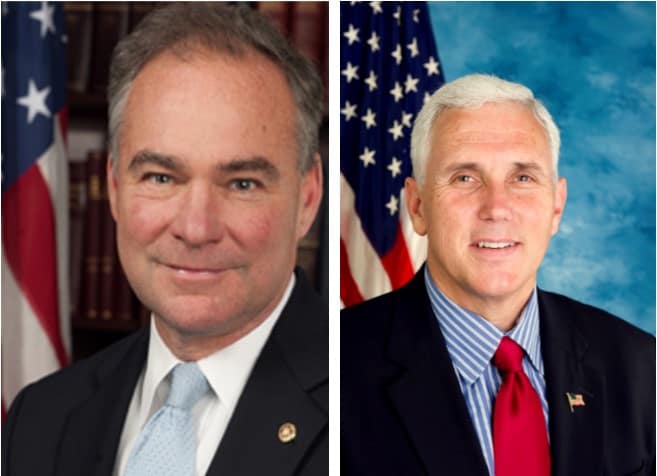
By most accounts, tonight’s Vice Presidential debate candidates Democratic Senator Tim Kaine and Republican Governor Mike Pence will meet for the only time as virtual unknowns to many voters. NBC has this analysis:
“The two running mates are among the least known vice presidential candidates in recent elections. Remember Sarah Palin, Dick Cheney and even Joe Biden? Of course. But many voters in 2016 have never heard of Clinton’s and Trump’s number two. In the latest NBC/WSJ poll, 55 percent of respondents either didn’t know enough about Kaine to form an opinion about him or were completely neutral. And 49 percent said the same thing about Pence.
“While both candidates’ primary goal is to reassure skeptical voters that their ticket can be trusted and that they compensate for the presidential candidates’ perceived weaknesses, a secondary goal will be to drive home policy differences. Because both Pence and Kaine, with long histories of governing, are well steeped in policy, this could be the most substantive debate of any of the three presidential debates.”
If issues finally take center stage tonight, we would certainly hope to hear the stark differences between the two candidates on Social Security and Medicare described for voters. As we first detailed here, Mike Pence, was one of Congress’ most aggressive Social Security privatization supporters. As leader of the Republican Study Committee, the House’s far-right wing caucus, during the Bush administration, Pence doubled-down on President George Bush’s failed privatization efforts by calling for an even larger private accounts scheme to be implemented sooner, putting Americans at even greater fiscal risk than the President’s doomed plan. The Washington Times reported in 2005:
“The Bush plan allows workers to divert 4 percent of their wages into investment accounts, and to choose from a set of investment strategies. But the conservatives are leaning more toward a plan sponsored by Rep. Paul Ryan, Wisconsin Republican, which would allow diversion of 6 percent of wages.
‘Conservatives want to see personal retirement accounts that have immediate relevance to younger Americans, that they can see the value, and that will require that they be big and that they be implemented in the final bill without delay,’ said Rep. Mike Pence, Indiana Republican and chairman of the 100-member Republican Study Committee (RSC).”
Beyond privatization, Pence’s comments make it clear there isn’t a Social Security, Medicare or Medicaid benefit cut he won’t embrace:
“I think everything has to be on the table…I think it’s absolutely imperative, whether it’s Social Security, Medicare or Medicaid.”
“With regard to entitlements we’re going to have to take some deep cuts in domestic spending.” CNN, 2010
“I was tea party before it was cool.” Indianapolis Monthly, 2011
On health issues, Pence’s record is just as anti-senior as his Social Security stance. He aggressively opposed the Affordable Care Act (ACA) and fought for its repeal, which would worsen Medicare’s solvency and take away billions in added benefits and cost savings for seniors. He voted against the creation of a prescription drug benefit (Part D) in Medicare, opposes allowing the re-importation of prescription drugs and allowing Medicare to negotiate for lower drug prices, he supported legislation that would deny non-emergency treatment for lack of a Medicare co-pay, and most importantly supports the GOP/Ryan budget which would destroy Medicare in favor of “Couponcare,” giving seniors a voucher to take shopping for insurance rather than protecting traditional Medicare’s guaranteed coverage.
Not surprisingly given his legislative history, we scored Mike Pence at 0% on issues important to seniors during the 2011-2012 Congress since he voted for multiple pieces of legislation that would cut benefits and programs that protect senior’s health and financial security.
Tim Kaine, on the other hand, has long opposed the privatization of Social Security. He supports healthcare reform through the Affordable Care Act and has co-sponsored the Medicare Prescription Drug Negotiation Act (S. 31), which would end the ban on prescription drug price negotiations for Medicare, allowing the government’s largest health care program to use the same price negotiation process that the Veterans Administration uses to negotiate with pharmaceutical companies. Kaine is also a member of the Senate Special Committee on Aging and co-sponsored the reauthorization of the Older Americans Act.
The differences between the two Vice Presidential candidates on the issues of Social Security and Medicare couldn’t be starker. We only hope tonight’s debate provides an opportunity for voters to hear about the issues which directly impact millions of Americans’ lives.


